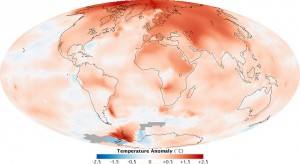Reports From the UN Climate Negotiations in Doha, Qatar
Blog: Last summer I was an intern for the New Brunswick, New Jersey office of Food and Water Watch, where I got to see state-level politics and environmental negotiations at work. So when The University Centre for Development Cooperation (Universitair Centrum voor Ontwikkelingssamenwerking - UCOS) in Belgium gave me the opportunity to attend the United Nations Climate Change Conference, informally referred to as Doha 2012 or COP 18, I knew I would get to see similar work on an international level. In the wake of Hurricane Sandy and increasingly erratic weather patterns, more Americans are accepting that global warming is real, and that we must take action both in the United States and in global agreements. Unfortunately, the U.S. did not sign the Kyoto Protocol to lower global green house gas emissions, and U.S. negotiators are widely considered to be playing a spoiler role. At every passing round of climate negotiations, I hope that the United States will join this fold of the international community. As a global power, we should lead on this issue and set a good example. Instead we are receiving tongue-in-cheek awards like Fossil of the Day.

By Daniel Weinshenker, Former FWW Intern
Last summer I was an intern for the New Brunswick, New Jersey office of Food and Water Watch, where I got to see state-level politics and environmental negotiations at work. So when The University Centre for Development Cooperation (Universitair Centrum voor Ontwikkelingssamenwerking – UCOS) in Belgium gave me the opportunity to attend the United Nations Climate Change Conference, informally referred to as Doha 2012 or COP 18, I knew I would get to see similar work on an international level.
In the wake of Hurricane Sandy and increasingly erratic weather patterns, more Americans are accepting that global warming is real, and that we must take action both in the United States and in global agreements. Unfortunately, the U.S. did not sign the Kyoto Protocol to lower global green house gas emissions, and U.S. negotiators are widely considered to be playing a spoiler role.
At every passing round of climate negotiations, I hope that the United States will join this fold of the international community. As a global power, we should lead on this issue and set a good example. Instead we are receiving tongue-in-cheek awards like Fossil of the Day.
I came to Doha with hope that this would not be a repeat of “Nopenhagen,” i.e., the 2009 climate change conference in Copenhagen that left the environmental community disappointed and discouraged for lack of leadership. But it was clear that the vibe in Doha was no better. Folks chattered that it was “as we expected,” slow and detailed but without much action or commitment.
Global agreements to reduce emissions are especially important for developing nations and some are working in coalitions. For example, small island nations have grouped themselves together to act as one block, which gives them a stronger voice. This has also been effective in Africa.
I went to a presentation hosted by Cape Verde’s permanent ambassador to the United Nations, Ambassador Lima who spoke about the success of being part of the African group. Before the coordination, no one listened to Cape Verde, a small island African state. But now being part of a collective voice for Africa, people must listen. This sense of regionalism has also spread to the Balkan states and Middle East and it has been very interesting to see how it changes the negotiations.
The discussion of finance is the main cause for conflict among all conference participants. The big debates going on are over funding for climate change adaptation and mitigation through the Green Climate Fund (GCF) and the next phase of the Kyoto Protocol. Carbon markets have been proposed and implemented in ever-increasing locations and yet the most popular example, the European ETS, is in a state of disrepair with credits trading at all-time lows. India has even made a seemingly desperate suggestion for the GCF to be used to bail out failing carbon market.
Aside from the negotiations, I also took time to explore the Sustainability Expo, which Qatar is simultaneously hosting to showcase new sustainable products and technologies. While some of the products were innovative, it made me very weary of “green washing.” There were so many petroleum and plastic companies touting newer, greener, more innovative ways to either capture natural gases or make more fuel efficient gas-guzzling SUVs.
While those new technologies might be greener than the old ways, they still do not sound like the solution. As consumers, we need to re-think the “green” products that we purchase. Ultimately, we can’t buy our way out of global warming; we must consume less, and reuse and recycle more.
With President Obama’s reelection, I have a new hope that climate change will become a main issue that will be tackled in the upcoming term. But it will not be addressed without public urgency and pressure. We need to reach out to our elected officials and let them know that climate change and environmental conservation are important to us. As one of my favorite quotes says, “Don’t stand by, stand up.”
**For more reflection on the Doha 2012 climate negotiations, check out:
Climate Justice Advocates Slam Doha’s Emerging “Sham Of A Deal”
IBON International’s Climate Updates
The Pan African Climate Justice Alliance’s Climate Updates


